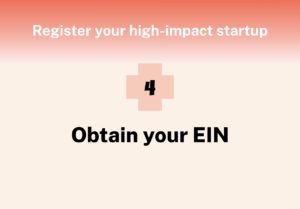
This post is part of a series designed to help you register a high-impact startup. Here, we focus on an employer ID specific to the US, although equivalents are common in other jurisdictions.
Why you need an EIN
An Employer Identification Number (EIN) is also known as a Federal Tax Identification Number, and is used to identify a business entity. Generally, businesses need an EIN in order to:
- Operate a separate legal entity. While sole proprietors can use their Social Security Number (SSN), other legal structures must apply for an EIN — like corporations or LLCs.
- Protect your Social Security Number. Sole proprietors can operate a business using their SSN. However, they must share it with vendors, clients, tax authorities and more for tax purposes. Using an EIN protects your SSN from being shared and reduces the potential for identity theft.
- Open a bank account. You cannot open a business bank account for most forms of business without an EIN.
- Apply for credit in the name of the business. Many banks require an EIN for your business when you apply for a loan, credit card, or line of credit.
- Hire employees. The federal government requires businesses to have an EIN if they hire an employee or withhold taxes on income paid to a non-resident alien. Your EIN is used for Federal and state payroll tax reports and payments.
- Apply for business licenses and permits. Use your EIN when applying for business licenses, permits and other requirements.
- File forms with the government. Your business must have an EIN when filing tax returns for employment, excise, or alcohol, tobacco and firearms.
Eligibility & application process
You may apply for an EIN online if your principal business is located in the United States or US Territories. The person applying online must have a valid Taxpayer Identification Number (SSN, ITIN, EIN).
You may apply for an EIN in various ways, including online. This is a free option provided by the Internal Revenue Service and you can get your EIN immediately. You must check with your state to confirm whether you need a state number or charter.
The application will require you to:
- Select your organization type (e.g. Sole Proprietorship, Partnership, Corporation, etc.)
- Provide a reason for requesting an EIN (e.g. you’re starting a business, hiring employees for the first time, opening a bank account, etc.)
- Authenticate your personal information (e.g. SSN)
- Share your business location (and mailing address)
- Share business information (including its name, county and state of registration, and date of formation)
EINs for hybrid structures
EINs apply to foreign subsidiaries and multinational corporations, but their application depends on the context and the specific needs of the entities involved.
Foreign subsidiaries:
- Foreign subsidiaries of US corporations: If a US corporation has a foreign subsidiary, the subsidiary itself might not need a US EIN unless it has US tax obligations (e.g., it has employees in the US or conducts business in the US requiring tax filings). If the foreign subsidiary has operations or assets in the US that require tax filings or it needs to open a US bank account, it will need an EIN.
- US subsidiaries of foreign corporations: A US subsidiary of a foreign corporation must obtain an EIN to comply with US tax laws. This EIN is used for filing tax returns, paying taxes, and other regulatory requirements.
Multinational corporations:
- US entities: Each US-based entity within a multinational corporation must have its own EIN for tax reporting and compliance purposes. This includes US branches, divisions, and subsidiaries. EINs are required for a variety of activities, including hiring employees, opening bank accounts, and filing corporate tax returns.
- Non-US entities: Foreign entities that do not have US operations generally do not need a US EIN. However, if they engage in activities that create a tax nexus in the US, such as having employees or significant operations in the US, they would need an EIN. Foreign entities filing for certain US tax benefits, such as claiming treaty benefits or withholding tax exemptions, might need an EIN to file the necessary forms with the IRS.
Other federal registrations
Besides obtaining your EIN, or federal tax number, you may be required to register with other federal agencies. For example:
- Beneficial ownership information reporting: Many companies in the US will have to report information about their beneficial owners – the individuals who ultimately own or control the company. They will have to report the information to the Financial Crimes Enforcement Network. FinCEN is a bureau of the US Department of the Treasury. Beneficial ownership reporting is a requirement of the Corporate Transparency Act of 2021.
- Trademarks: If you want to trademark your business, brand or product name, file with the US Patent and Trademark office once you’ve formed your business.
- Tax-exempt status: If you want tax-exempt status for a nonprofit corporation, establish tax exemption with the IRS. We’ll cover this in a future post.
- S-corps: To create an S corp, you’ll need to file form 2553 with the IRS.
Stay tuned for our next post: Register with your state.